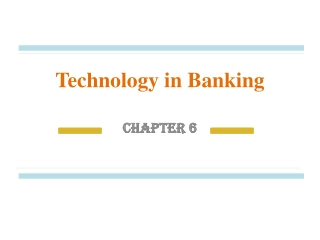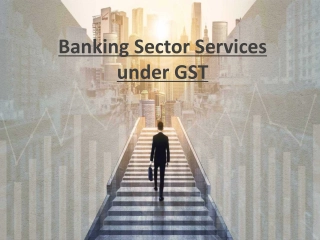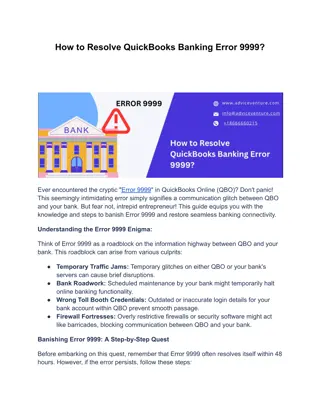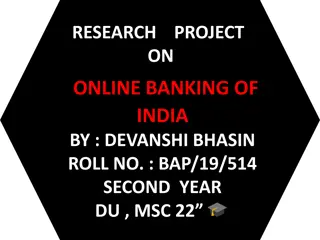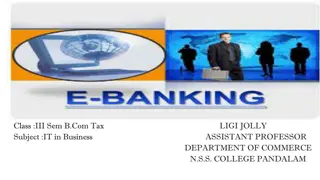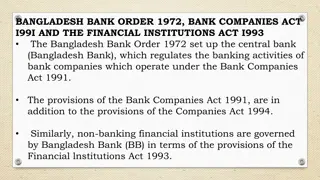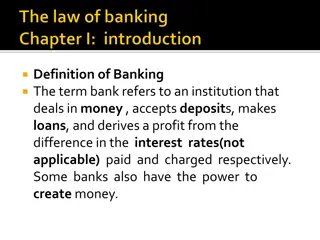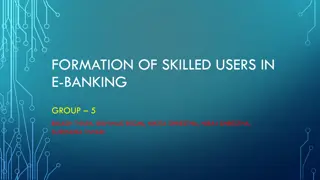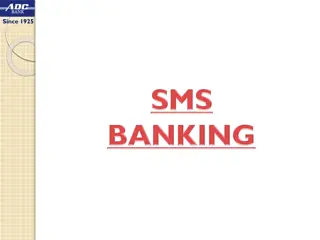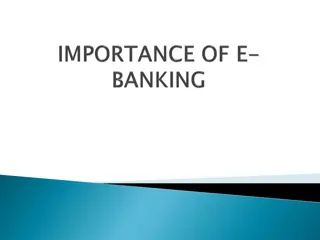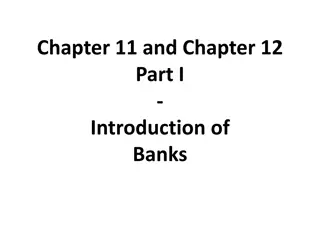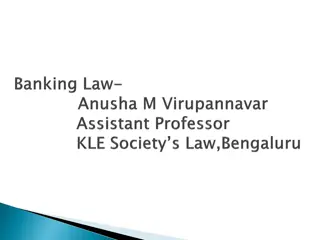
Preventing Cyber Fraud in Banking Through Awareness
"Learn about common types of cyber fraud in banking like phishing, vishing, and smishing. Understand how fraudsters operate and how to protect yourself from UPI fraud. Join the bank's campaign to raise awareness during International Fraud Awareness Week. Stay informed to safeguard your personal and financial information. #CyberFraud #BankSecurity #FraudPrevention #AwarenessCampaign"
Download Presentation

Please find below an Image/Link to download the presentation.
The content on the website is provided AS IS for your information and personal use only. It may not be sold, licensed, or shared on other websites without obtaining consent from the author. If you encounter any issues during the download, it is possible that the publisher has removed the file from their server.
You are allowed to download the files provided on this website for personal or commercial use, subject to the condition that they are used lawfully. All files are the property of their respective owners.
The content on the website is provided AS IS for your information and personal use only. It may not be sold, licensed, or shared on other websites without obtaining consent from the author.
E N D
Presentation Transcript
Classification - Internal Safe Banking Happens with Secure Banking Classification - Internal
About International Fraud Awareness Week Classification - Internal International Fraud Awareness week is a yearly campaign which the bank supports Objective: Raise awareness about Fraud by promoting anti-fraud awareness and education Target: Law Enforcement Agencies, Senior Citizens, Customers, Partners, Students etc. Encourage Leaders, LEA, Influencers & Employees to proactively take steps to minimize Fraud Demonstrate our organization s commitment to Preventing and Detecting Fraud Bank has planned various Internal and External programs to spread awareness For more info - Visit https://www.fraudweek.com/ Classification - Internal
Classification - Internal Common Types of Cyber Frauds Vishing Skimming Common types of cyber frauds Fake Helpline Phishing Smishing Card Cloning Classification - Internal
Classification - Internal Common Types of Cyber Frauds Smishing Phishing Vishing Type of fraud that results in theft of personal data such as Customer ID, IPIN, Credit/Debit Card number, Card expiry date, CVV number etc. When fraudsters try to seek personal banking data like Customer ID, Net Banking password, ATM PIN, OTP, Card expiry date, CVV etc. through phone call Using mobile text messages to lure victims into calling back on a fake phone number, visiting fake websites or downloading malicious content via phone or web. More Information: https://www.hdfcbank.com/personal/useful-links/security https://youtu.be/aSVY0l3nizA Classification - Internal
Classification - Internal Classification - Internal
Classification - Internal UPI Frauds Pay and Collect Transactions approved by Customers using UPI PIN How do fraudsters operate? Fraudster call users and to draw attention, they represent themselves as the bank's representative Then they try to scare you that your card, mobile banking will get blocked due to the ongoing issues in the App Once hacker convinced you to believe their words, they ask to download an app to fix the problem This app can be AnyDesk or Team Viewer any other remote device control app like it Once downloaded the app or similar one, through next steps he can get access to your mobile screen and see all that you do Under the pretext of helping he will also be able to view the Banking Credentials which he is asking you to type on the phone Using banking credentials, like Debit card no., Expiry Date, UPI PIN he can then initiate transactions without your permission How to protect yourself from fraud: To prevent a UPI fraud, one need to make sure and be aware of the person behind that phone call asking you to download any app or share any confidential financial information Also, if you receive any suspicious text message with a link or a phone number from a banking institution, you need to ignore it or visit your nearest bank branch to confirm it Banks, credit card issuers or any financial institutions do not make such calls or send SMS of such nature Also, try not to disclose your phone number especially on social media to avoid any UPI fraud transaction. More Information: https://www.hdfcbank.com/personal/useful-links/security https://youtu.be/aSVY0l3nizA Classification - Internal
Classification - Internal Fake Helpline numbers Helpline number obtained through searching on internet may not be genuine How do fraudsters operate? Customers seeking a solution to a problem do a Google search and call up a helpline number that has been updated by fraudster on Google Most do not bother to look up the organization's website or the papers they may hold to locate the official phone numbers Unaware, customers call on the fake helpline numbers that the fraudsters have updated To resolve the issue, fraudsters ask customers to share banking information, like, card details and the OTP details received on their phone As soon as customers share their card details, OTP, the money gets transferred from the customer s account to the fraudster s account. How to protect yourself from fraud: Helpline numbers online are not genuine. You must visit the official website of the company for contact details Never provide your personal details to anyone over the call. No banks or reputed companies will ask you to provide your bank credentials over the phone Don' t fall in the trap of such fraudsters More Information: https://www.hdfcbank.com/personal/useful-links/security https://youtu.be/aSVY0l3nizA Classification - Internal
Classification - Internal SIM Swap Fraud Under SIM Swap, fraudsters get a new SIM card issued against your mobile number, which they use to get One Time Password (OTP) and alerts, required for making transactions through your bank account. How do fraudsters operate? Fraudsters get customer details like mobile number, A/c details through Phishing, Vishing, Smishing or DarkWeb Fraudsters then manage to get a duplicate SIM Card for the same number belonging to customer They send SMS (20 Digit SIM Number) to customer through SMS and ask them to forward the same to 121 (Cust Ser. Num) of the telecom operator, post which the customer s mobile number gets deactivated and blank SIM in possession of fraudster gets activated. Fraudsters then generate One Time Password (OTP),which is received on the new SIM card, to facilitate transactions. How to protect yourself from fraud: If your mobile no. has stopped working, check with your mobile operator to make sure you haven't fallen victim to SIM Swap. Register for SMS and Email Alerts to stay informed about your account activities. Regularly check your bank statements and transaction history for any irregularities. More Information: https://www.hdfcbank.com/personal/useful-links/security https://youtu.be/aSVY0l3nizA Classification - Internal
Classification - Internal Skimming A type of fraud in which the details on a debit/credit card are recorded and then transferred to a duplicate card. This is done without the knowledge of the original credit card holder. How to protect yourself from fraud: Do not share your card Debit / Credit card to anyone for processing transaction Ensure your Debit / Credit card swiped in your the presence and the same is not used on any suspicious terminal Check for any suspicious object at the ATM card insert slot Please check if any camera is placed near to Keypad to avoid ypur PIN number being captured Avoid taking assistance from any stranger at the ATMs and ensure no one is able to see your PIN number Change your Debit / Credit card Pin at regular intervals More Information: https://www.hdfcbank.com/personal/useful-links/security https://youtu.be/aSVY0l3nizA Classification - Internal
Classification - Internal Secure ATM Banking Memorize your PIN. Do not write it down. Do not share your PIN or card with anyone. Change your PIN regularly. Use your body to shield the keypad as you enter the PIN at the ATM Do not take help for using the ATM or handling cash. Do not use ATM if you find any unusual device attached to it. Wait for the welcome screen before moving away from the ATM. Take your card and transaction slip. Shred any transaction slip immediately after use if not needed. If your ATM card is lost or stolen, contact your bank immediately If there is any discrepancy after you deposit a cheque or card into the ATM, contact your bank. Register your mobile number with the Bank to get alerts for your transactions If your card gets stuck in the ATM, or cash is not dispensed call your bank immediately Any complaint about your ATM/Debit/Credit card transaction should be reported to the bank. More Information: https://www.hdfcbank.com/personal/useful-links/security https://youtu.be/aSVY0l3nizA Classification - Internal
Classification - Internal Mobile Security DO s Password protect the phone. Keep the max number of wrong password entries to three. Create a strong password. Check for any unauthorized transactions when reviewing account statements Change your IPIN regularly Immediately report loss of mobile phone to your service provider and police. DONT s Never disclose your PIN or confidential details over the phone or internet. Don t click on links in emails/social networking sites claiming to be from the bank Don t transfer funds without validation of the beneficiary, transferred funds cannot be reversed Don t store sensitive information on your phone. Inform the bank of change in your mobile no.to ensure SMS alerts are not sent to someone else Never reveal any email or paper from the bank concerning the PIN or password Be cautious with offers from caller tunes or dial tunes or email attachments from known/unknown sources Be cautious when using Bluetooth in public places as someone may access your confidential information Be careful while browsing the web. If a website doesn t look authentic, close it immediately. More Information: https://www.hdfcbank.com/personal/useful-links/security https://youtu.be/aSVY0l3nizA Classification - Internal
Classification - Internal Secure Net Banking Tips Do not disclose your Customer ID and IPIN to anybody Change your IPIN as soon as you receive it and memorize it Avoid internet banking from cyber cafes or public Wi-Fi networks like hotels, airports etc. Do not click on links in emails or sites other than www.hdfcbank.com to access Net Banking Always visit the HDFC Bank's Net Banking site through HDFC Bank's home page by typing the bank's website address https://netbanking.hdfcbank.com in the address bar Check the URL as to verify the Bank s Net Banking page and the PAD Lock symbol at the top left of the browser Disable "Auto Complete" feature on your browser Uncheck "User names and passwords on forms", click on "Clear Passwords Click "OK" Use virtual keyboard while logging into your internet banking account Cross check your last login information available on Net Banking at every login to monitor any unauthorized logins Always type in your confidential account information. Do not copy paste it. Monitor transactions regularly using HDFC Bank's "InstaAlerts" service and notify the bank of any fraudulent activity Always logout before closing the browser when exiting Net Banking More Information: https://www.hdfcbank.com/personal/useful-links/security https://youtu.be/aSVY0l3nizA Classification - Internal
Classification - Internal Secure Online Shopping Tips Always shop or make payments through trusted/reputed websites Do not click on links in emails. Always type the URL in the address bar of the browser Before entering private details, always check the URL of the site! Frequent online shoppers should signup for Verify by Visa and Master Card secure code program Check account statements regularly and notify the bank of any fraudulent transaction Check for PAD LOCK symbol on the webpage before starting to transact Do not enter your confidential account information in any pop-up windows Using One Time Password received on the mobile is more secure than static Visa and Master card secure code More Information: https://www.hdfcbank.com/personal/useful-links/security https://youtu.be/aSVY0l3nizA Classification - Internal
Classification - Internal Secure Internet Browsing Tips Observe click discipline while browsing through different websites You may land up clicking on to malicious link that could download malicious code / software or virus on to your computer Downloading software from non-trustworthy sites including torrent sites may lead to infecting your computer with virus Read privacy policy of the website before entering personal information such as name and email ID Be aware of how your information would be used by the website owner More Information: https://www.hdfcbank.com/personal/useful-links/security https://youtu.be/aSVY0l3nizA Classification - Internal
Classification - Internal Secure Banking Tips For more information visit the below sites, https://www.hdfcbank.com/personal/useful-links/security Secure Banking Tips Regional Language Tamil - https://youtu.be/jiaMjtUopaI Telugu - https://youtu.be/QeCJokJZFjU Kannada - https://youtu.be/7oUC-1-TyTE Malyalam - https://youtu.be/CB6dPmJwCxw Assamese - https://youtu.be/A60g6ecH3RQ Marathi - https://youtu.be/eEoBoxtKAS0 Bengali - https://youtu.be/b0kw9Gn_8-U Gujarati - https://youtu.be/iWdeM4Ujq_Q Punjabi - https://www.youtube.com/watch?v=-Pt_Igv4Mek&feature=youtu.be Oriya - https://youtu.be/goaKG2xVmUQ English - https://youtu.be/aSVY0l3nizA Hindi - https://youtu.be/r1zdInHE0Gk Classification - Internal
Classification - Internal Thank You Classification - Internal

